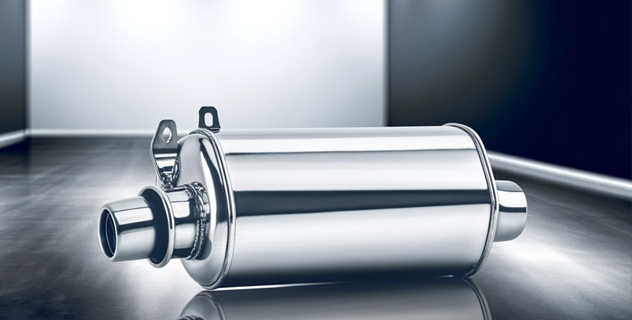Why is my muffler so loud all of a sudden? It can be alarming. Spooky, hey? Since one of the muffler’s primary roles is to lower the sound from your exhaust system, most significant changes in its standard noise are symptomatic of a greater problem. For vehicle maintenance and safety, it is essential to know why a loud muffler happens and what the consequences could be. This post will cover some common reasons why your muffler might get louder unexpectedly, what problems could result from this, and how to deal with them.
What is a Muffler and What Does It Do?
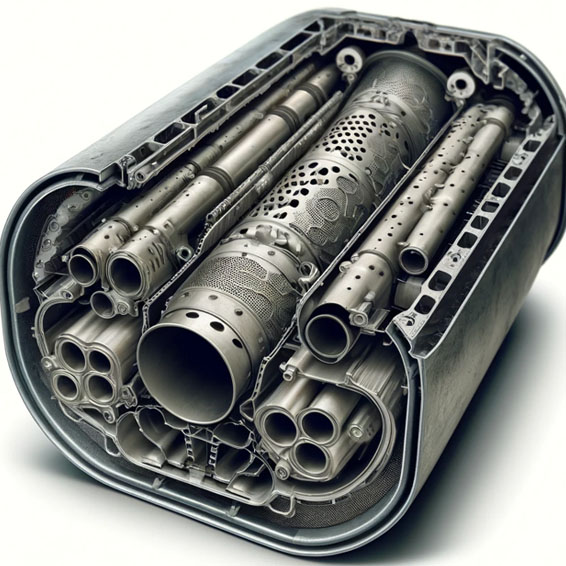
The muffler is an essential part of the car’s exhaust system that reduces the noise created by engine exhaust gases. A noise cancellation working principle involves reflecting sounds off through various chambers and perforated tubes to eliminate them. Several factors over time can degrade your muffler, impacting how loud it is. Knowing these factors can help you stay ahead by ensuring performance and avoiding hazards.
Type of Mufflers
Chambered Mufflers
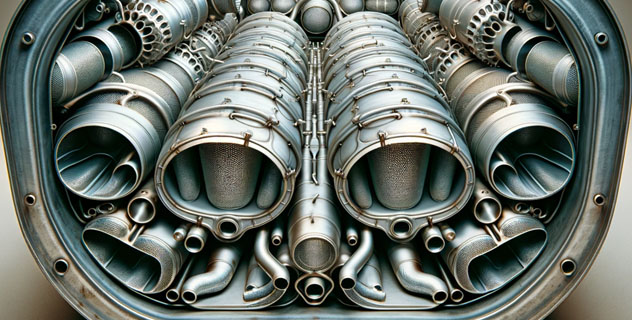
Design:
The sound waves are bounced against each other through a series of chambers.
Sound:
Have a deep, throaty exhaust note.
Performance:
Sound moderation is balanced well with performance enhancement.
Typical used in: Chambered Mufflers are Used in muscle cars and performance vehicles.
Glasspack Mufflers
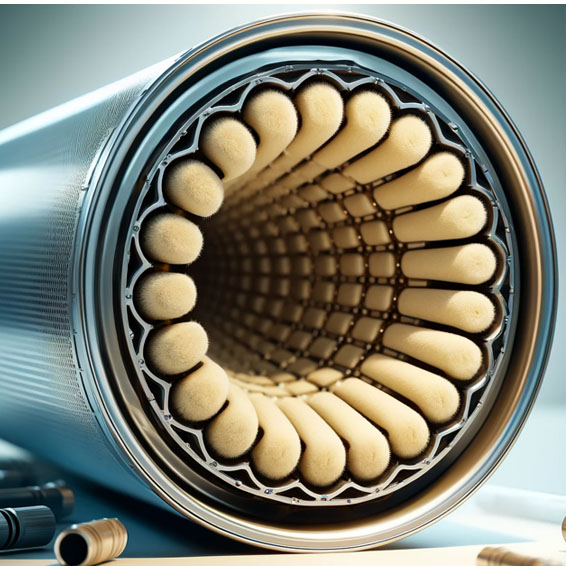
Design:
Straight perforated tube with sound-absorbing material wrapped around it.
Noise:
High and aggressive, with minimal noise reduction.
Performance:
Excellent horsepower-increasing flow.
Exemplary use:
High-performance and racing automobiles.
Turbo Mufflers
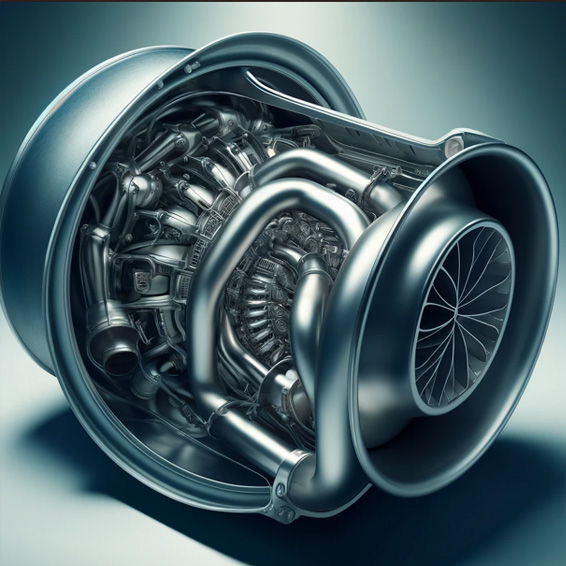
Design:
Contains the elements of the chambered and straight-through design; includes internal baffles.
Sound:
Quieter than straight-through but louder than chambered mufflers.
Performance:
Slight improvement with overall effective reduction of noise.
Typical used:
Used in General use and high-performance vehicles.
Performance Mufflers
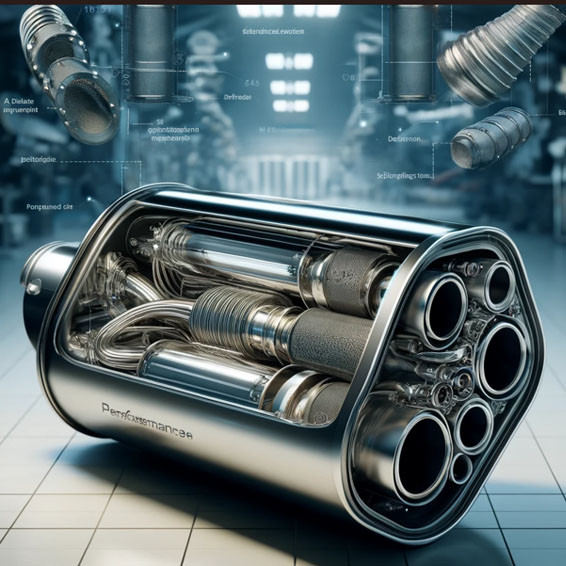
Design:
Designed specifically to improve exhaust flow and sound.
Types:
Depends significantly on the design but can range from deep growls to high-pitched tones.
Performance:
Designed to maximize performance enhancement.
Common Uses:
Turbo Mufflers are used in Sports cars and customized vehicles.
Silencer Mufflers
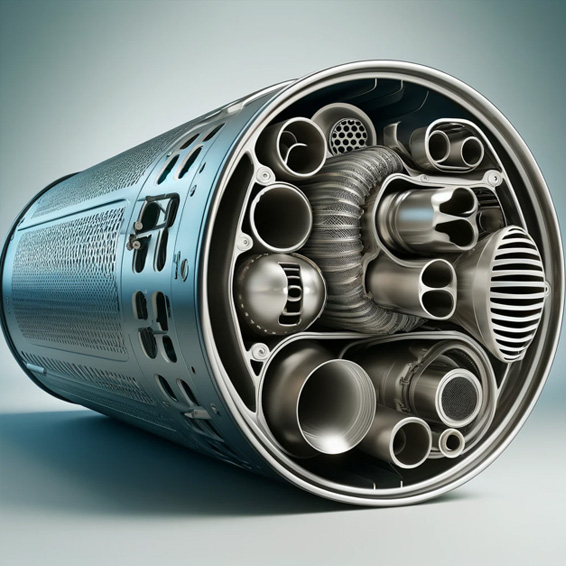
Design:
that will ensure maximum noise reduction through multi-layered sound attenuating.
Sound:
Quite silent, whereby performance is prioritized over noise levels.
Performance:
Little to no performance improvement.
Typical Uses:
High-end cars and low-noise technology-oriented. Each type of muffler fulfills various needs and desires that involve improving the vehicle’s performance and exhaust noise. It is the point at which a decision on the delivery of power and sound requirements will be made.
Why Is My Muffler So Loud All of a Sudden
Common Reasons for a Loud Muffler:
Many things can cause your muffler to sound very loud suddenly.
Muffler Damage or Corrosion
Mufflers experience high temperatures and environmental wear, which can cause them to degrade over time. The causes are too many to list, but these are some of the most common ones:
Rust and corrosion
Rust and corrosion are common problems in older vehicles. However, for others kept in areas with high humidity or on salted roads during winter, this is an even worse issue. Over time, the muffler’s metal bits deteriorate, and holes or cracks start forming. It causes all those harmful exhaust gases to escape, which in turn causes a loud noise output.
Exhaust Leaks
Even if the exhaust system, namely the muffler, exhaust manifold, or pipes, becomes weak, an exhaust leak will occur from anywhere in it. Most leaks result from damage, corrosion, or loose-fitting connections. Exhaust gases will leak out of these openings, avoiding the noise-canceling chambers on your muffler and making a loud difference in exhaust sound.
Components of an Exhaust System That Go Bad
The exhaust system comprises various components, such as the catalytic converter, resonator, and multiple pipes. Each of these parts can sometimes fail or be damaged, in which case the effectiveness of your exhaust system is compromised, and increased noise results. For instance, when a resonator gets damaged, it may be unable to reflect and cancel out sound waves as efficiently as it usually would, causing your exhaust to become louder.
Several clamps, hangers, and brackets help keep the exhaust system together. Should any of these parts come loose or broken, the muffler may shift out of place, resulting in some rattling or increased noise levels. Regular inspections would provide a warning that the above are becoming an issue and may save this looming disaster.
How a Loud Muffler Can Affect Your Car
Not only is a loud muffler irritating – but in most cases, it also has several adverse effects on the vehicle and your driving experience. These include:
Bad Fuel Consumption
Maintaining an efficient, working exhaust system is crucial to keeping the engine running optimally and reducing fuel consumption. If one or more of the muffler’s components are damaged, your engine may have to use more power to send exhaust gases away from the compartment. This can lead not only to fuel inefficiency but also to performance issues.
Increased Emissions
A damaged muffler or exhaust leak may cause your vehicle to produce more pollutants, contaminating the environment and triggering a failed emissions test. Failure to comply could lead to fines or expensive repairs to bring systems up to code.
Potential Engine Damage
Only some loud mufflers will ultimately damage your engine if ignored long enough. An exhaust leak can cause a loss of back pressure, which is necessary for the engine to function correctly. It can lead to a lack of power, reduced acceleration, or, in some cases, even engine overheating.
Safety Issues
A loud muffler may distract the driver and other drivers on the road. Exhaust leaks can also allow hazardous gases such as poisonous carbon monoxide to enter the car’s cabin, potentially leading to lethal consequences.
Diagnosing and Fixing a Loud Muffler
If your muffler gets notably louder, it needs to be taken in for diagnosis and fixing immediately! These are the steps to follow:
Visual Inspection:
Begin by looking at the exhaust system for any visible damage to various components, including rust, holes, or if connections are loose. The muffler, exhaust pipes, and clamps also need your open eyes. A flashlight will help you better scenarios under the vehicle.
Listen for Leaks
A running engine should be smooth and quiet — most of the time. Listen for unusual, big hissing sounds indicating a hole in the exhaust manifold or pipe. You can also check for escaping gases simultaneously by moving your hand close to exhaust components without touching them. (Be careful because they might be hot.) If you can’t determine the cause, see your mechanic.
Repair or Replace Components
Depending on the level of damage, you could be looking at reparations for an existing product—or maybe it’s time to look at replacements. It might include patching small holes, tightening loose connections, or replacing a rusted-out muffler. In some instances, however, replacing a stock unit with a “better” aftermarket muffler will yield superior muffling and a more desirable exhaust tone.
Preventative Maintenance Tips
The bottom line is that regular maintenance will keep excess muffler noise from sneaking up on you and will virtually add years to the life of your exhaust system! Some key points to note are:
Routine Inspections:
Always inspect your exhaust system routinely for damage, wear, and telltale signs so you can stay updated on your car’s current condition. Identifying these early signs can prevent something fairly minor from becoming a big issue.
Rust Prevention:
Coat your exhaust components in a few layers of rust-resistant coatings and wash your ride regularly to remove road salt, dirt, and debris.
Secure All the Connections:
Ensure that there are no loose clamps, hangers, or brackets on your water service. Replace any that are worn or damaged.
Professional Servicing:
The most straightforward solution is to get your vehicle serviced by a professional mechanic, in compliance with the manufacturer’s recommendations, of course. You should also regularly undergo check-ups to detect any problems early on and avoid them.
Conclusion
In conclusion, if you’re experiencing a sudden loudness from the muffler, it could indicate any of the above. Understanding some of the most common causes and effects associated with a loud muffler will help you to be more proactive in diagnosing these issues before they become too severe. That way, your car can stay running safely and efficiently and always protect the environment! To maintain your exhaust system, ensure you are getting it fixed at the correct time and doing regular maintenance on it.

